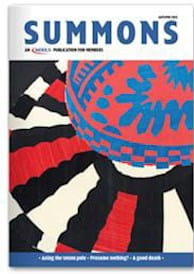I RECENTLY completed a series of psychometric tests and attended a feedback session to receive my results. Among some of the points to emerge was a suggestion that I am perhaps “too trusting”, along with a “strong preference for taking time to consider her choices” and “scoring unusually highly on sensitivity”.
The patient woman charged with explaining such results to an inquisitive academic noted, in passing, that my profile may be helpful in pastoral work or caring roles but might be a hindrance in situations where performance management or difficult and time-sensitive decisions are required. In other words, “trusting” could be considered naïve, “thoughtful” might manifest as ponderous and “sensitivity” may appear as fragile.
The fact that I accepted the results and have ruminated on their meaning suggests that at least two of the characteristics attributed to me – being trusting and preferring to think at length about things – have been accurately captured despite my best efforts to resist definition by data. And, the experience has prompted me to reflect more on a particular approach to ethics, namely virtue ethics.
As some readers will know, virtue ethics is an approach in which particular characteristics or traits are identified as desirable and likely to lead to positive moral outcomes. It is an ancient philosophy, described by Aristotle who argued that the pursuit of Eudaimonia or human flourishing was the proper function of “living well”. In a virtue-based approach, the human and relational aspects of healthcare practice are acknowledged and emphasised. Thus it is that virtues such as integrity, compassion, fairness, humility and respect are prioritised to inform the moral choices and behaviour of clinicians..
Irrespective of the issue or moral problem at hand, clinicians, it is argued, should strive to respond in a virtuous way in which they attend as much to the process of a response as to its content. It is an approach that can equally well elucidate the moral dimensions of routine clinical practice as well as significant questions of life and death.
As with any ethical theory or philosophy, a virtue approach has its limitations. For some, it might suggest a sense of “motherhood and apple pie” in which positive attributes or traits are offered as meaningless or even patronising panacea to any ethical question or moral challenge. For others, the complexity and context that inform the definition of the virtues renders it a frustratingly slippery and relativist approach to moral reasoning. For those interested in exploring virtue theory, I recommend the work of Alasdair MacIntyre and Christine Swanton. For those seeking a better understanding of how virtue ethics might shape the work of a practising clinician, Peter Toon’s writing on virtue and general practice is excellent.
Following my encounter with the post-psychometric test feedback process, I am reminded that most virtues, if unchecked or applied indiscriminately, can become if not vices, then a hindrance. Research profiling practitioners who find themselves in difficulty at work (such as that led by Jenny King of Edgecumbe Health for the National Clinical Assessment Service) reveals that these are not, for the most part, dysfunctional or “bad” people set on causing problems. Rather, it is often the case that desirable characteristics have become problematic when the practitioner has encountered difficulties or stressors. As such, conscientiousness becomes critical perfectionism, thoroughness turns into inflexibility, sensitivity develops into brittleness and altruism yields to burnout.
The notion of the unquestionable virtue is contestable: almost all virtuous traits have the potential to become damaging if they are excessively developed or inappropriately applied to a situation. But surely, you may be shouting (if shouting at magazines is something you do), there are some virtues that are inherently desirable. I have, as befits a woman who tends to think too much, been ruminating on this question for some time over the summer. I’ve concluded that it is difficult to identify such a trait.
My favourites for the title of ‘most inherently desirable virtue, 2013’ are wisdom and sincerity. Why so? I think it is because these are two virtues that capture not merely characteristics but also particular behaviours. Wisdom implies, to me, judgement based on an awareness of self, others and experience. It encompasses ideas of discretion and flexibility depending on context and circumstance. Similarly, sincerity, for me, suggests an engagement with others and care that is authentic and responsive. It is a virtue that recognises that the personal and the professional always coalesce in clinical relationships. Sincerity demands that the professional is present both physically and otherwise. It is the bedrock of caring.
So, whilst you may never take a psychometric test, what characteristics do you have that might be considered virtuous, or maybe even too virtuous? And are we all sometimes too good to be true?
Deborah Bowman is Professor of Bioethics, Clinical Ethics and Medical Law at St George’s, University of London
This page was correct at the time of publication. Any guidance is intended as general guidance for members only. If you are a member and need specific advice relating to your own circumstances, please contact one of our advisers.
Read more from this issue of Insight

Save this article
Save this article to a list of favourite articles which members can access in their account.
Save to library